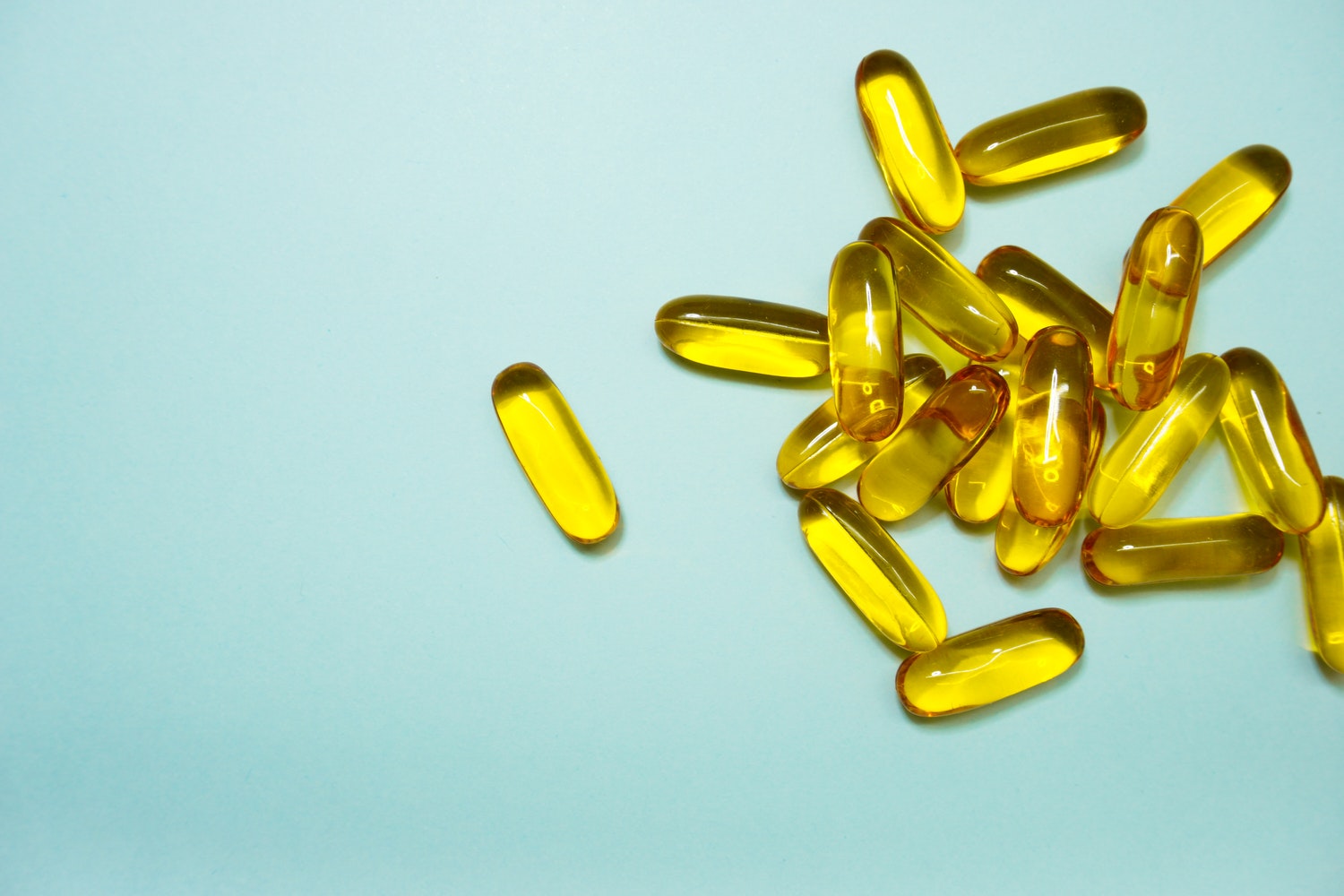
Dr. Eric Venn-Watson’s Highlights
It’s no secret, fish oil is a wildly popular supplement. Almost 18 million Americans have taken a fish oil supplement, and we’d wager if you’re reading this, you’ve either taken it, or are considering it.
Your health care provider may have suggested a fish oil supplement to support your health, especially if you’re needing a boost for your cardiovascular system, but you might still have questions. Together, we’ll talk about what fish oil is, why people take it, and discuss some potential side effects you should know.
Our mission at fatty15 is to make longevity your ally. As such, we’ll talk about how fish oil supports long-term health, and we’ll also talk about an alternative supplement that can support healthy aging, fish-free.
What’s the Scoop With Fish Oil?
Fish oil supplements line the shelves of practically every chain store that has a pharmacy department. With its seemingly endless popularity, it’s easy to assume it’s completely safe and effective. Even if you don’t really know what makes fish oil supplement-worthy, you might find yourself taking it “just because.”
What Is Fish Oil?
Fish oil is exactly what you think it is: oil derived from certain types of fatty fish. Fish like mackerel, salmon, trout, herring, and sardines are all types of fish from which fish oil is harvested and used for making fish oil supplements.
How Fish Oil Harvested
To extract fish oil, fish are heated to near boiling to separate oil, water, and protein. Once these liquid elements have been separated, the oil is centrifuged out, and either cold-pressed or wet-pressed to remove as many impurities as possible. During this process, the “guts” from the fish bodies are removed from the fish oil.
Why Fish Oil Is Used as a Supplement
Discovering how fish oil is extracted is, admittedly, a little off-putting. It will also make you question just why you’re consuming boiled fish parts in the name of good health.
Fish oil is a rich source of omega-3 fatty acids. Omega-3s can help support healthy, low blood triglyceride levels that can lead to a happier, healthier heart. They’re also used to support joint and bone health, helping support patients who suffer from rheumatoid arthritis and other bone and joint disorders.
Lowering triglycerides and improving joint pain can significantly improve a person’s wellbeing if they suffer from these conditions, but it’s worth noting that fish oil is only a supporter and isn’t meant to replace other medications or management methods.
What’s Inside a Fish Oil Supplement?
Fish oil contains two fatty acids, known as docosahexaenoic acid, or “DHA,” and eicosapentaenoic acid, or “EPA.” Neither of these polyunsaturated fatty acids are the essential omega-3, which is alpha-linolenic acid (ALA), but they’re still fairly good for you.
Essential means our bodies need the nutrient to function, but we can’t make enough of that nutrient on our own and need to consume it through diet or supplements.
That said, most of the time, you’ll get omega-3s through the foods you consume. Cod liver oil, flaxseed oil, chia seeds, walnuts, soybeans, oysters, and multiple types of fish contain omega-3 fatty acids.
The problem with many fish oil supplements is that they contain some fishy ingredients. Blends of different fish oils, questionable preservatives, and some synthetically created oils marketed as fish oil are all apt to find their way into your medicine cabinet. This may leave you wondering whether taking a fish oil supplement is worth the risk.
Seven Side Effects of Fish Oil Supplements
Before you decide whether or not fish oil is a good fit for your health stack, you should be aware of the risk of side effects. Although fish oil supplements can support heart health and tender joints, too much fish oil can actually have a negative impact on your health.
1. High Blood Sugar
High doses of omega-3s have been linked to an increase in blood sugar levels. Omega-3s trigger the release of glucose, so in a patient who already has elevated blood sugar levels, this could be incredibly problematic and make it difficult for them to regulate their blood sugar efficiently.
Unchecked, high blood sugar levels can contribute to insulin resistance and affect diabetes management.
2. Gastrointestinal Upset
It’s widely known that fish oil capsules can give you a fishy aftertaste in your mouth, fish breath, and the dreaded fish burps. Even capsules marketed as “burpless” aren’t really able to conceal that they do, in fact, still have the potential to create gastrointestinal upset. Generally, capsules that can upset your stomach are synthetically created.
Taking higher doses of fish oil can result in digestive issues like:
- Nausea
- Heartburn and indigestion
- Excessive burping
- Stomach discomfort
- Diarrhea
- Vomiting
If you experience any of these side effects, it’s recommended to stop taking your supplement and contact your doctor.
3. Low Blood Pressure
If you have high blood pressure, the thought of lowering your numbers through the use of a supplement sounds like a win. However, if you have healthy blood pressure to begin with, lowering your blood pressure may not be the best route to take. If you have low blood pressure, you could risk experiencing dizziness, fainting, and lethargy.
4. Bleeding
A few weeks into taking your fish oil supplement, you suddenly develop a nosebleed for the first time since grade school. Is it related? Possibly, and worth considering as bleeding gums and nosebleeds are known side effects of taking a fish oil supplement.
It’s worth noting that people who experience bleeding from fish oil supplementation are usually taking extremely high doses. Because of the effect fish oil has on blood clotting, your doctor will advise you to stop taking it if you have an upcoming surgery.
5. Toxicity
Some fish oil supplements are high in vitamin A. Cod liver oil, for instance, is a rich source of both omega-3 and vitamin A. Taking too much of a vitamin A supplement can result in vitamin A toxicity.
Symptoms of vitamin A toxicity include:
- Nausea
- Dizziness
- Joint pain
- Rash or hives
If you’re using a cod liver oil supplement long-term, be sure to discuss your liver health with your doctor. High levels of vitamin A can be damaging to your liver health.
6. Insomnia
Sleeplessness may not seem like a big deal if you only miss a night or two of good sleep. Long term, though, the effects of not getting enough sleep can be incredibly detrimental to your health. As such, it’s critical to ensure you’re not taking a supplement that could interfere with your sleep hygiene.
Taking too much fish oil can interfere with sleep, and if you already have sleep issues, it may make them worse.
7. Stroke
While many people begin taking fish oil supplements to support their hearts after a diagnosis of coronary heart disease, there’s some debate as to whether or not too much fish oil could cause weakened blood vessels that could lead to stroke.
Whether or not high levels of fish oil can lead to stroke is still in research, but if you are at high risk of stroke, it may be better to talk to your doctor about taking a different heart-healthy supplement.
A Better-Backed Supplement
So much fish, so many side effects. Wouldn’t it be great if you could support your health with a less fishy supplement? The good news: you can.
C15:0, also known as pentadecanoic acid, is an odd-chain, saturated fatty acid that science supports as the first essential fatty acid to have been discovered since the omegas.
Elevate your cells. Elevate your self.
Where Does C15:0 Come From?
C15:0 is found mostly in whole-fat dairy products, like full fat butter and whole milk, as well as some types of fish and plants. That means you may not be getting much of it in your diet. Outdated dietary guidelines (from the 1970’s) have had us avoiding dietary fat, but as it turns out, not all fats are bad. In fact, some fats, like C15:0, are really good for us.
What Does C15:0 Do?
C15:0 is a sturdy essential fatty acid that helps support our bodies on the cellular level.* By supporting our cells, C15:0 gives them a fighting chance against aging.
Here’s how it works:*
-
Cell membrane support. As we age, our cell membranes become weak, leaving our cells vulnerable to external stress. C15:0 integrates itself into our cells’ membranes, fortifying them and keeping them strong and protected.
-
Improved mitochondrial function. Our mitochondria power our cells to carry out everyday cell processes. As we age, our mitochondrial function naturally declines. C15:0 boosts mitochondrial function by up to 45%, helping to give us back the feelings of menergy we had when we were younger.
- Improved cellular signaling. By activating special receptors in our body called PPARs, C15:0 helps support homeostatic functions like sleep, mood, appetite, and metabolism, helping to put your body back into balance so you can feel your best every day.
-
Improved mitochondrial function. Our mitochondria power our cells to carry out everyday cell processes. As we age, our mitochondrial function naturally declines. C15:0 boosts mitochondrial function by up to 45%, helping to give us back the feelings of menergy we had when we were younger.
Every system, organ, and tissue in your body is made of cells. When your cells are healthy, your body is healthy. Taking C15:0 to improve your cellular health is a scientifically backed way to support your overall health, and it takes just one capsule a day.*
How To Get C15:0
There are a few reasons why taking a supplement to obtain this essential fatty acid may be beneficial.
First, it's made ready-to-absorb. In milk (and other foods), C15:0 is attached to branches of lipids called triacylglycerides. That means our gut has to use digestive enzymes to break down these triacylglycerides to release C15:0 as a free fatty acid. Once C15:0 is released, it is ready to be absorbed.
These multiple steps can make our absorption of C15:0 from foods less efficient.
In contrast, FA15™ in fatty15 is our proprietary pure, powder C15:0 ingredient already in free fatty acid form. Less work for the gut, more good C15:0 for our bodies.
It's not mixed with bad saturated fats. While the good C15:0 fatty acid is present in whole fat dairy products in trace levels, there are much higher levels of “bad” even-chain saturated fatty acids that continue to be associated with poorer health. That is probably why studies evaluating the effects of milk on our health are mixed (some say dairy fat is bad for us, while others say it is good for us).
Fatty15 provides just the good fat without the bad fats.
It skips the cows and calories. Whole fat dairy products provide a wallop of calories, including sugars (aka lactose), that also require, well, cows. The calories in whole fat milk likely explain why a large-scale recent study showed that adults who drink more dairy milk are more likely to have a higher body weight.
Further, the movement to more plant-based milk and meat replacements are driven by a desire for more animal-free products, as well as a desire to veer from cows and cattle because of concerns around methane production. Interestingly, plant-based milk replacements lack C15:0 altogether.
Fatty15 offers a vegan-friendly C15:0, with only 1 calorie per dose.
Fatty15: A Fish-Free Approach to Your Health Stack
Fatty15 is the once-a-day supplement that contains the pure, vegan-friendly version of C15:0, and nothing else. Just one simple ingredient is enough to support your cells, restore your essential C15:0 levels, and help you feel healthier and age smarter.*
Get started with fatty15 today and support more than just your heart, fish burps-free.
Sources:
Omega-3 Supplements: In Depth | NCCIH

Eric Venn-Watson M.D.
CEO, Co-Founder
Senior Scientist, Co-Founder
Eric is a physician, U.S. Navy veteran, and Co-founder and COO of Seraphina Therapeutics. Eric served over 25 years as a Navy and Marine Corps physician, working with the special forces community to improve their health and fitness. Seraphina Therapeutics is a health and wellness company dedicated to advancing global health through the discovery of essential fatty acids and micronutrient therapeutics.
You May Also Like...
10 Foods Good for Your Liver: The Ultimate Guide
Your liver does a lot for you. If it had a voice of its own, it might ask you to eat more veggies and cut back on your Old Fashioneds. Unfortunately, the liver doesn’t receive a lot of attention until...
How To Improve Your Gut Microbiome: 6 Tips
Interested in how to improve your gut microbiome? We’ve got six tips to help your gut thrive and improve your overall digestion.


